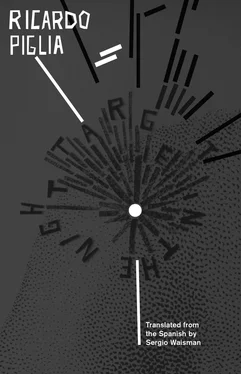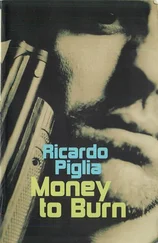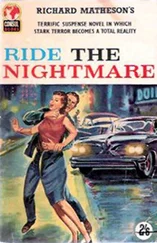“One afternoon, Lucio burned his hands in an explosion in the lab at the college and had to get his hands bandaged like a boxer, and Bimba took care of him, she looked after him, he couldn’t do anything on his own because of his hands. The following week, the next time she came back on Friday, she went straight to my brother’s room, changed his bandages, shaved and bathed him, spoon-fed him, and they chatted and had a great time. That same weekend Lucio asked her to stay with him, he offered to pay by himself what all the others paid together so that she would please not go with the others, but Bimba laughed and stroked his hair, she listened to his stories and his plans, and then she went off to bed with the other guys, in the other rooms, while Lucio suffered, lying on the bed, his bandaged hands in the air and his head full of horrible images. He’d go out to the patio, hear laughing, happy voices. They call Lucio ‘Bear’ because he’s enormous and because he always looks sad, or kind of spaced out. Ever since he was a little kid his problem was always his innocence, he was always gullible, too trusting and too good. That night, when Bimba was in bed with Guerra, where she continued her rounds after Lucio, my brother could hear them laughing in bed, and he lost it. He got up, enraged, his hands bandaged, he kicked Guerra’s door in and stormed into the room and knocked over the bedside table and the lamp that was on it. Guerra got up and started hitting Lucio, beating him — and my brother, as weak as he was, with his hands completely unusable, he fell to the ground right away and didn’t defend himself, and Guerra kept kicking and insulting him, he wanted to kill him. At that point, Bimba jumped on Guerra, naked, and started scratching and yelling at him to leave Lucio alone, until finally they had to call the police.” Sofía paused. “But the extraordinary thing,” she went on, “is that my brother quit college, he left everything and came back to town and married Bimba. He brought her home, he imposed her on the family and had kids with her, everyone knows that she used to be a working girl, and my mother is the only one who won’t speak with her, she’s always pretended that she was invisible, but no one else cares because Bimba is wonderful, she’s so much fun. My sister and I love her, she’s the one who taught us everything there is to know about life, and she’s the one who took care of Lucio during all these lean times and kept the house running with the few savings still remaining from the years of grandeur. My father liked her, too, she must have reminded him of the Irishwoman. Still, he was disappointed, he wanted his sons and his sons’ sons to be, as he said, country men, owners of estancias, men of influence and wealth, men with weight in local politics. He could have been a governor if he had wanted to, my father, but he never wanted to get into politics, he just wanted to control it from behind, and maybe what he imagined for his sons was a future as owners of large estancias, as senators or caudillos, but his sons went in a different direction — and Luca, after their confrontation over the factory, never wanted to see him or even step in this house ever again.”
Both sons had inherited from their grandfather Bruno a country mistrust and a taste for machines. They started working in his company at a very early age. “My grandfather,” Sofía said, “when he retired from the railroad, he was a representative for Massey Harris. They expanded the workshop behind the house, on Mitra Street. That’s how it all began. You must have heard the legend of the neighborhood chicken coop…”
“Yes,” Renzi said, “they welded at night, with the blowpipe, and the chickens from next door watched the whole time, dazzled by the light, maddened and drunk, their eyes like gold coins in the dark. They’d jump around, the chickens, clucking, stunned by the whiteness of the welding machine, as if an electric sun had come out at night…”
“Drugged,” Sofía said. “Cluck, cluck. The chickens doped by the glare, when they put a corrugated fence up to keep in the glow from the welding blowpipe, the chickens became desperate, they’d climb the wire of the coop looking for the whiteness, they had withdrawal symptoms. I remember seeing that light when I was a girl, too, crisp as glass. We used to go to the workshop all the time, we lived with the machines, Ada and I. My brothers made us the most extraordinary toys that any girl has ever had, dolls that could walk on their own, or dance as if they were alive, with gears and wires connected to a tape recorder, dolls that talked in Argentine slang, they’d make them look like showgirls, which would drive our my mother crazy. Once they made me a Wonder Woman that could fly, she’d circle above the patio like a bird, I’d guide her with a fishing reel, I could make her go around in the air, red and white, with stars and stripes, so beautiful I could barely breathe. My sister and I adored our brothers, we followed them everywhere, they used to take us to the dances with them (my sister with Lucio, me with Luca), my sister and I wearing high heels and make-up, pretending we were a couple of night girls from town out with our boyfriends, we’d go to the dances in the area, the neighborhood clubs, the dance floor they set up on the paleta courts with the colorful lights and a band on a platform playing tropical music, until our mother intervened and ended the party right then and there — that party anyway.”

19 “I’ll teach you differences” ( King Lear , I.4).
20 Suppose we show the image to someone in the country, Croce said. He says: “It’s a duck,” and then, all of a sudden: “Oh, it’s a rabbit.” He’s recognized it as a rabbit. He’s had an experience of recognition. Likewise, if someone sees me walking down the street, they’ll say: “Ah, it’s Croce.” But one doesn’t always have an experience of recognition. The experience occurs at the moment of changing from duck to rabbit, and vice versa. I call this method seeing-as . Its goal is to change the aspect under which certain things are seen. This seeing-as is not part of perception. It’s like seeing, but it’s also not like seeing.
They headed out of town in Croce’s car, at midnight, on a side road that bordered the district line, toward Tapalqué. They drove across the countryside, avoiding the fences and the still animals. The moon was occasionally covered by the clouds, so Croce would use the searchlight attached to his side of the car, a bright bulb with a handle that could be adjusted by hand. All of a sudden, in the illuminated circle, they saw a rabbit, paralyzed by fear, white, motionless — like an apparition in the middle of the dark. Caught in the light beam, it was a target in the night 21that they quickly left behind. They drove for several hours, bumping along because of the pits in the road, staring at the silver lines of the wire fences under the stars. Finally, turning off at a wooded path, they saw a glow from the lighted window of a country house in the distance. By the time they reached the source and were getting close to the small house, dawn was starting to break on the horizon, turning everything a pinkish hue. Renzi got out and opened the gate so the car could enter and go down a narrow road surrounded by bushes. A peasant was sitting on a bench under the house eaves, drinking mate . A patrol officer was dozing off nearby, leaning back against a tree.
The sorrel was in the field next to the house, covered with a plaid blanket, and one of its legs was bandaged. The man on the bench was the horse’s keeper, an ex-broncobuster named Huergo or Uergo, Hilario Huergo. A dark gaucho, tall and thin, he smoked and smoked as he watched the two men approach.
Читать дальше













